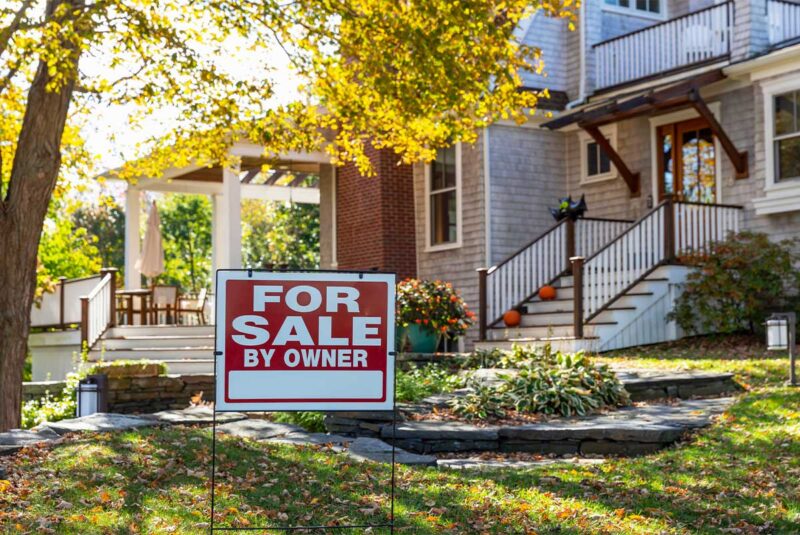Ready To Buy a Home?
Get Approved to Buy a Home
Rocket Mortgage® lets you get to house hunting sooner.
Before home buyers can get to the moment when the seller’s agent hands over the keys to their new home, they probably start their home buying journey with one question: Is now a good time to buy a house?
The right time to buy a house depends on your personal finances and the market in your area. We’ll go over the pros and cons of purchasing a home now. Our goal is to help you decide for yourself based on your financial situation.
Before we begin, a word of caution: Nobody can predict the future, especially when it comes to the finance and housing markets. Despite this uncertainty, the long-term outlook of homeownership remains strong. In the past 30 years, the median sales price of U.S. homes has increased by 249%, despite any downturns in the market.[1]
It’s best to treat buying a home as a serious, long-term investment.
Should I Buy a House Now? Pros and Cons
Provided your finances are in order, there’s a case to be made that 2023 is a good time to buy a house. Here are the upsides and the risks of pulling the trigger soon.
Pros of buying now
Homes are staying on the market longer
In June of 2022, homes lasted a median of 31 days on the market. That’s up to 44 days in June of 2023.[2] This could be an indication that we’re transitioning toward a buyer’s market.
The longer a home sits unsold, the more willing sellers usually are to negotiate. If a house sits long enough without attractive offers, you may also start to see reduced prices on the listings themselves.
Even if you can’t get the price you want, you might be able to get the seller to cover closing costs.
Home prices have come down
In the 4th quarter of 2022, the median sales price of a home in the U.S. was $479,500. For Q1 of 2023, that dropped to $436,800.[1]
A lot of factors go into this, including the Federal Reserve (aka The Fed) raising interest rates to combat inflation. However, as a buyer, prices coming down could give you an opportunity to leap on a property and save some money.
Interest rates could keep rising
Nobody knows for certain what interest rates are going to do. But much of it will depend on what the Federal Reserve decides to do with the federal funds rate over the rest of the year.
They could raise rates again, likely leading to higher mortgage rates. If rates continue to rise over the next year, you might wish you’d capitalized on the rates available now.
Long-term benefit of buying with higher interest rates
The argument here is short-term pain for long-term gain. There are experts who believe now is a great time to buy a house because of the high interest rates. In many markets, this is tempering the soaring home values we saw during the pandemic.
Buying now means you’ll likely have a higher mortgage payment. However, the hope is that in the long-term, rates will eventually fall again. Assuming they do, homes could begin to appreciate faster than they are now. If you buy a home when interest rates are high, you can refinance once they fall. This will leave you with a more manageable mortgage payment and the benefit of surging equity as home prices rise.
There are a lot of “ifs” in this scenario. However, if it pans out, it could pay off handsomely for buyers.
Cons of buying now
Low inventory
While inventory has increased slightly since the dramatic lows during the pandemic, inventory is still relatively low. In June of 2023, there were 613,791 active listings in the U.S. For context, in June of 2020, there were over 870,000 listings available.[3]
When inventory is low, there’s more competition for houses, which creates a seller’s market. This puts sellers in a more advantageous position than buyers.
On top of that, fewer available houses means there are fewer choices for buyers, which makes it more likely they’ll have to settle for a higher price than they intended.
Buying near peak pricing
Q1 of 2023 was the first time the median home sales price had fallen since 2020.[1] That means if you purchase a home now, you’re still purchasing at price levels near the pandemic peak.
If home values continue to fall in the short-term, you could regret not waiting longer to buy.
High interest rates
In their June 2023 meeting, the Federal Reserve ended a 15-month streak of raising interest rates.[4] However, there has been no indication that rates will be cut anytime soon, and increases are still on the table for 2023 as the fight against inflation continues.
Translation: Interest rates aren’t likely to come down significantly anytime soon. That means you’ll be locking in a mortgage at a relatively high interest rate. That means a more expensive mortgage payment and less buying power right now.
Could go underwater in the short-term
Recession fears lurk, and we don’t know how far home prices could fall. There’s a chance that if you buy a home now, the market value could drop in a year or two, and you’ll owe more on the house than it’s worth. That’s known as being underwater on your mortgage.
While the long-term outlook for the housing market remains strong, there’s substantial risk in the short-term – especially if you’d need to sell your house for an unexpected reason.
Are You Ready To Buy a House?
It doesn’t matter what the economy is doing if you aren’t financially prepared to own a home. You’re responsible for more than mortgage payments when you own a home. You’re also responsible for paying property taxes and maintaining the property.
Ask yourself these questions to help determine whether you’re ready to buy a house:
Are you ready to move in for the long term?
For many of us, buying a home is a long-term commitment that means setting down roots and living on the property for at least 2 – 5 years. If you’re a digital nomad or a globe-trotting adventurer, chances are now isn’t the right time to buy a home.
According to the National Association of REALTORS®, home buyers expected to stay in their homes for a median of 15 years.[5]
Of course, you aren’t obligated to live in a home for 15 years. But if you move within the first 2 years of purchasing the home, you’re less likely to profit on the sale of your property. Even if you can sell your home for a profit, you won’t be eligible for the capital gains tax exclusion on the first $250,000 of the sale if you’re single and $500,000 if you’re married.[6]
One of the many benefits of owning a home is building equity, which takes time. If you’re committed to staying for the long-term, there isn’t really a bad time to buy a house once your finances are ready.
Are your finances ready?
Unless you’re planning to buy a home with cash, you’ll need a lender to approve you for a mortgage loan. Mortgage lenders will take a close look at your finances to verify how much money you have and your creditworthiness. Some of the factors lenders commonly review include your:
- Credit score: You may have the income and enough money saved, but you’ll need a solid credit score to get approved for a mortgage. Most lenders prefer a credit score of at least 620, although certain loan types and lenders will have lower or higher credit score requirements.
- Income: Do you have a steady income? Do you have enough money coming in to afford your monthly payments? If you’re not sure, use the 28% rule. The rule is that you spend no more than 28% of your gross income on your monthly housing payment.
- Savings on hand: Do you have enough savings set aside for your down payment, closing costs, maintenance and moving expenses? Even if you’re going to make a smaller down payment, plan on saving at least 5% of the home’s purchase price before you buy a home.
- Debt-to-income (DTI) ratio: Lenders will look at your DTI ratio as part of your loan application. DTI ratio maximums can vary, but for conventional loans, you’ll need a DTI ratio that’s lower than 45%.[7]
Is there a right mortgage for you?
From conventional loans and jumbo loans to government-backed loans, there are many different mortgage types. Each mortgage type may offer various benefits to different home buyers, so it’s worth taking the time to review all the requirements for the mortgages you’re interested in.
Is your budget ready?
Buying a home is expensive. You can take out a mortgage to help you purchase a home, but you’ll be on the hook for the upfront costs (down payment, closing costs, etc.) and the long-term costs (monthly payments, property taxes, homeowners insurance, home repairs, etc.).
A good indicator that it might be the right time to buy a house is having a solid budget and enough money saved to help ensure your home purchase is a long-term success. To know how much you’ll need to budget for your home purchase, you should figure out how much home you can afford. Fortunately, you can use our mortgage calculator to help you estimate the cost of homeownership and your monthly mortgage payments.
Is It a Bad Time To Buy a House? Not if You’re in It for the Long Haul
There’s no perfect time to buy a house. If you’re looking to flip a property, it’s hard to know whether or not you’ll be able to turn a profit. But for those looking to make a long-term investment, once your finances are in order, it may make good sense to make a home purchase now.
Home is worth it.
The mortgage process can be exciting, and we’ll be with you all the way. Take the first step to owning a home. You’ll be glad you did.
The Short Version
- Indicators that 2023 could be a good time to buy a house include homes are sitting longer, prices have dropped and the long-term outlook of homeownership remains strong
- Reasons to wait include inventory is still an issue, you’re purchasing near peak pricing and the housing market could drop in the short-term
- If you can afford to buy a home and plan to stay there long-term, now could be a good time to buy. However, there’s never a perfect time
St. Louis Fed. “Median Sales Price of Houses Sold for the United States.” Retrieved July 2023 from https://fred.stlouisfed.org/series/MSPUS
St. Louis Fed. “Housing Inventory: Median Days on Market in the United States.” Retrieved July 2023 from https://fred.stlouisfed.org/series/MEDDAYONMARUS
St. Louis Fed. “Housing Inventory: Active Listing Count in the United States.” Retrieved July 2023 from https://fred.stlouisfed.org/series/ACTLISCOUUS
NPR. “The Federal Reserve Finally Hits Pause on Raising Interest Rates.” Retrieved July 2023 from https://www.npr.org/2023/06/17/1182941206/the-federal-reserve-finally-hits-pause-on-raising-interest-rates
National Association of REALTORS®. “Highlights From the Profile of Home Buyers and Sellers.” Retrieved July 2023 from https://www.nar.realtor/research-and-statistics/research-reports/highlights-from-the-profile-of-home-buyers-and-sellers
Internal Revenue Service. “Topic No. 701 Sale of Your Home.” Retrieved July 2023 from https://www.irs.gov/taxtopics/tc701
Fannie Mae. “Selling Guide.” Retrieved July 2023 from https://selling-guide.fanniemae.com/Selling-Guide/Origination-thru-Closing/Subpart-B3-Underwriting-Borrowers/Chapter-B3-6-Liability-Assessment/1032992131/B3-6-02-Debt-to-Income-Ratios-02-05-2020.htm#DTI.20Ratios




